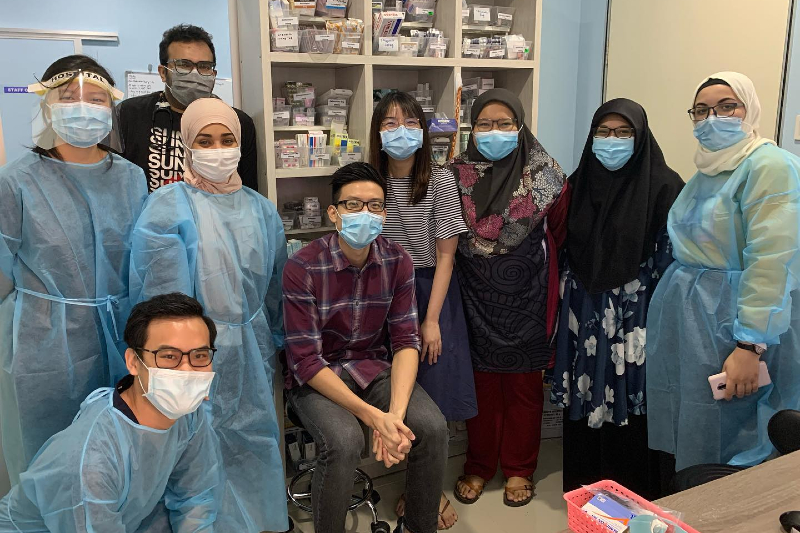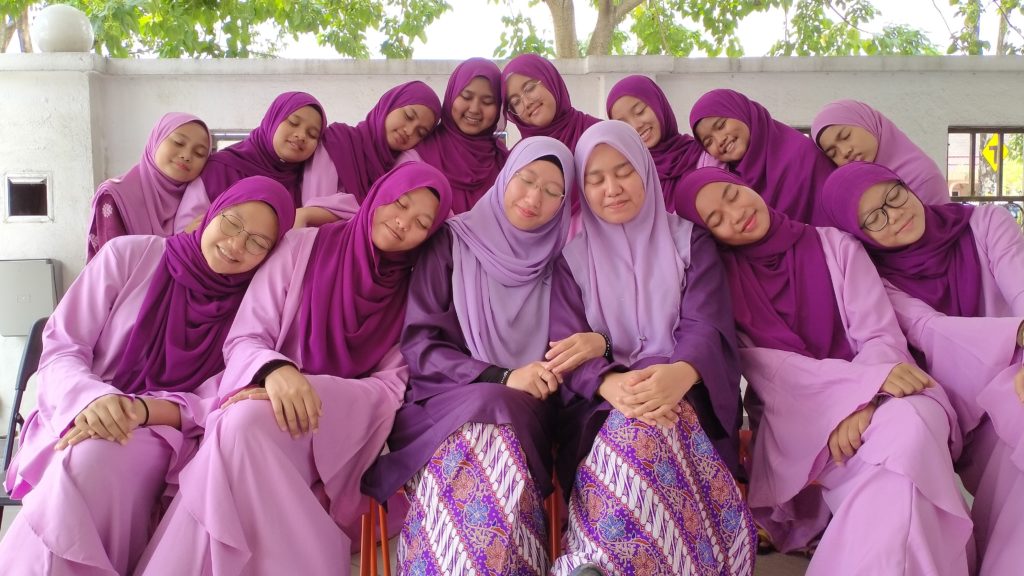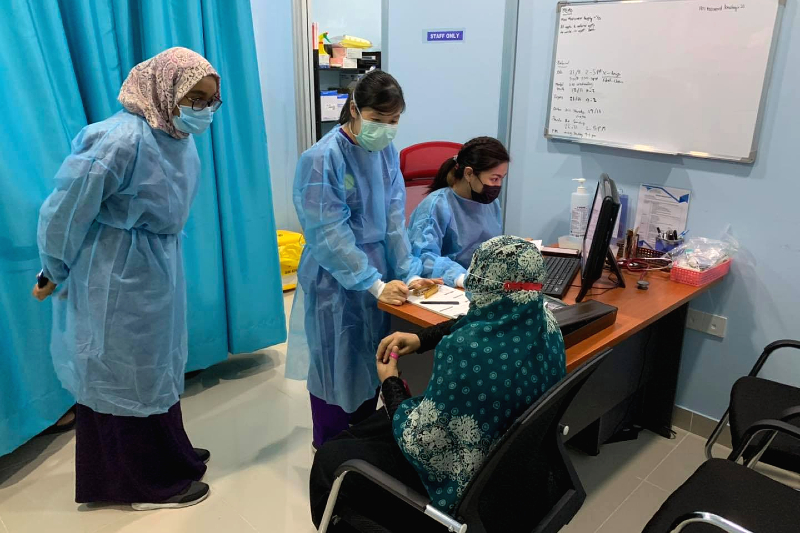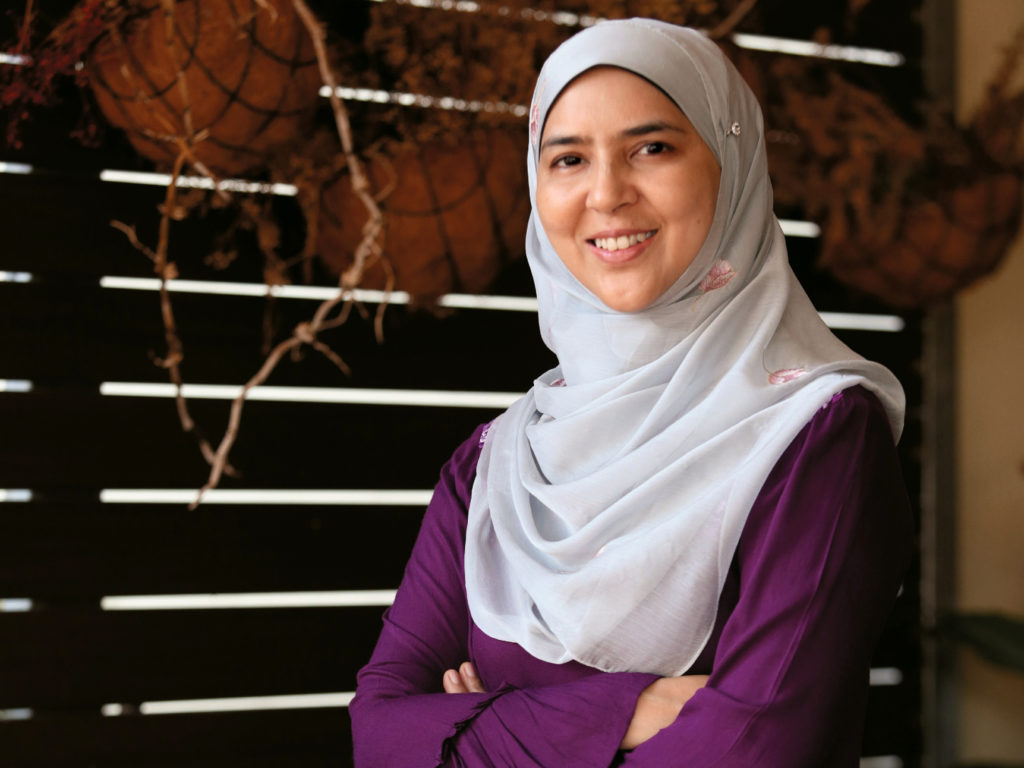Driven by Faith
Leaving private practice for part-time academia, Dr Siti Noraida Habibullah made her childhood dream of supporting the medical needs of underserved communities come true.
When Dr Siti Noraida Habibullah was a child, she harboured three great dreams — a career in medicine, being a good wife and mother, and the chance to do something good for orphaned children. A practising doctor in a private hospital and mother to four daughters aged 16 to 26, Aida — as she prefers to be called — was grateful for two of her visions coming true and, as her children grew up, realised that she had to soon do something about the third. In 2015, she left her job in a private hospital in Shah Alam and embarked on a journey of a lifetime that gave her the chance to provide for underserved communities, specifically for medical care that they deserved, but had limited access to.
These efforts have culminated in Klinik Amal Muhajir, a clinic in Serdang that solely serves the needs of refugees in the area. There are many barriers to healthcare access for refugees and the asylum-seeking population in Malaysia, and Aida believes that she and her team of volunteers can help close this gap by providing free consultation, minor procedures, regular follow-ups for non-communicable diseases, and health education tailored to this migrant population.
By doing so, Aida hopes to improve the health literacy and status of refugees and asylum-seekers, which will give them a better quality of life, and better navigation in the health system. At present, the clinic’s patients pay a nominal fee per visit, but for those who cannot afford even that, payment is waived altogether. The clinic runs on donations — in cash and kind — from Aida’s friends and family as well as other well-wishers, which she acknowledges is not sustainable in the long term. But rather than wait for all the answers, Aida decided to jump in head first with faith that the universe will provide. While it has, she is hoping to develop a more reliable long-term funding plan.

Healthcare volunteers at Klinik Amal Muhajir
Although the clinic is a major project for her now, Aida’s work for refugees and the underserved began much earlier. Upon resigning from her job in the corporate services and quality assurance division at Avisena Specialist Hospital, she took on the role of senior lecturer at the Jeffrey Cheah School of Medicine and Health Sciences at Monash University Malaysia. She was involved in health service management and bioethics — an assignment that gave her enough time for more social work. She started volunteering with various orphanages in the Klang Valley, and, as she learnt about how public and private welfare systems worked, formulated her own plan.
In 2017, Aida founded the Little Steps Foundation, an umbrella brand under which she could park the many community projects she had in mind. “Little Steps was the manifestation of a little girl’s dream of fixing the wrongs, making it right,” the 51-year-old says. “It’s named as such to remind me that the biggest difference can be made by the smallest steps in the right direction.”
Little Steps covers a range of areas under its six project verticals — education, shelter, health, sustainability efforts, community welfare and international relief efforts. One of its first — and ongoing — projects was Haneen Firdous, a home for girls from high-risk social and family backgrounds. In Arabic, haneen means deep longing, while firdous means the highest garden in paradise. The home currently houses only 12 girls, as Aida believes it is important to have a small number to allow her to focus on them as individuals.
“The aim of Haneen Firdous is to educate my girls and give them a family environment with love and discipline. I hope to be able to care for them all the way to tertiary education, if they’re able,” she says. “I believe in solutions, which is what I try to do with Haneen Firdous. My aim is to provide a solution for my girls — in this case, education and self-esteem.”

The 12 girls who live at Haneen Firdous
Klinik Amal Muhajir is not her first project under Little Steps’ health and medical relief efforts. Aida founded a free clinic for the poor in the Kg Chhnang province in Cambodia in collaboration with NGO Angkatan Sukarelawan Asas Sejahtera, and together with the Hope Spring Welfare Foundation, has been supporting door-to-door treatment for the sick and needy in crisis-stricken Yemen. All Little Steps projects rely on public donations to survive, and its structure is kept small enough so that Aida can manage operations on her own, and is able to channels all funds received toward the organisation.
At present, Klinik Amal Muhajir is exceptionally busy as the ongoing Conditional Movement Control Order (CMCO) has hit the refugee community hard. Unable to access the day-to-day work that would have, at a minimum, put food on the table, the luxury of medical treatment comes a far second. In addition to everyday issues like coughs and colds, they have long-term illnesses such as diabetes and high blood pressure, and more serious diseases such as cancer. While the average Malaysian can rely on free public healthcare, refugees cannot and need support — although the Malaysian government has kindly provided a 50% discount for UNHCR card holders, medical care remains a burden.
The clinic’s volunteer doctors do as much as possible on-site, and for more complicated cases, Aida calls on favours from friends in public and private hospitals for help. “The MCO was really tough on them,” she recalls wearily. “It’s a difficult situation to live through for anyone, but harder still when you are alone in a foreign land.”

Clinic Volunteers helping a patient
Her family has been most supportive of her calling to support communities in need, and Aida credits her husband, a surgeon himself, for supporting her morally and emotionally. “He pays for my expenses. He has been so supportive although I suppose I have given him no choice,” Aida quips. “My daughters are really involved as well, right from the website to spearheading other initiatives I have in mind. I want to open a cat sanctuary one day and one of my daughters has decided she will be in charge of that.”
Her long-term dream is for the clinic to grow big enough to provide assistance to more underserved members of the community, but to remain small enough so she can be actively involved. Her short-term goal? Sabah. “I don’t think I will open another refugee clinic. My next chapter is in Sabah, although I’m not entirely sure in what shape or form,” she says thoughtfully. “There are so many people doing great things there, but I think some proper co-ordination could make a big difference – and I do think that’s something I can help with.
“I don’t have a solid five-year plan for Little Steps, and to be honest, I don’t have a long-term goal as such. I’ve always enjoyed each step of my career as it came along. Being able to help people is something I’ve always wanted to do, and I’d say that I am so proud that my daughters are the same. When it comes to what I do … I believe that when your intentions are there and you have a passion for something, God will provide. I know this to be true because it happened that way for me.”
This article first appeared on Nov 30, 2020 in The Edge Malaysia.
© Copyright 2020 Little Steps - Designed by ZedPro
Nurturing Changes


Leave a Reply
You must be logged in to post a comment.